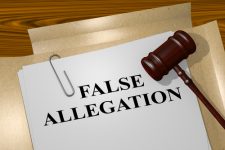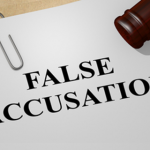False Sexual Assault Allegations Ruin Lives

The growth of the #metoo movement has led to concerns being expressed about the ease with which a person’s reputation, career and even freedom can be adversely affected through false sexual assault and sexual harassment allegations.
There are specific concerns that individuals are being presumed guilty based upon allegations alone, before their cases are even tested in court, and that those who make false allegations are not being brought to account.
There are additional concerns that exposing or even highlighting the existence of false allegations can reduce the likelihood of genuine victims coming forward due to a fear of being disbelieved.
In any event, the fact of the matter is that false sexual assault allegations do exist, they do destroy innocent lives and they do make it harder for real victims.
Proportion of allegations that are false
Determining the percentage of accusations that are false is impossible.
While criminal defence lawyers will point to the many cases that are dropped or thrown out of court due to inconsistencies so fundamental that the prosecution was implausible, victims’ groups will emphasise the relatively high-bar set for criminal convictions – being ‘beyond reasonable doubt’ – asserting that the inability to prove an offence does not equate to fabrication.
Those who consider the percentage of false allegations to be high also highlight the fact that police do not act upon all accusations, and those which they view as entirely unsupported or contradicted by other information may not be picked up by the statistics.
Another factor, of course, is that not every person who is convicted of a sexual offence is guilty. The US Innocence Project alone has led to the exoneration of more than 300 people who were convicted of serious offences including rape and other crimes. That Project has extremely limited resources and is only able to investigate a very small percentage of referred cases.
The Australian Institute of Family Studies (AIFS) speculates that the percentage of false sexual assault accusations may be somewhere between 2 – 10%. That figure is based upon a 2010 United States study which looked at reported cases in that country over a 10 year period.
The authors of the AIFS report conceded, however, that “There is broad agreement within the literature that the often-quoted figure of false allegations being around 2% of reported sexual assault allegations is unreliable.”
The authors further acknowledged that many complaints were not reflected in the reported statistics, because they were considered to be baseless.
Another United States study, published in the Journal of Forensic Psychology, looked at data from the Federal Bureau of Intelligence between 2006 and 2010, suggesting that between 4,400 and 5,100 rape allegations out of 87,000 to 90,000 per year were deemed baseless or false.
This equates to 5.55%, which was least five times higher than other offence categories.
But again, the study looked at a specific set of data which the authors acknowledge does not capture all complaints.
Purpose of false allegations
False complaints can be made for any one or more of many reasons – out of anger or vengeance, for financial interests, to bolster family law claims, to seek attention, as a cry for help, due to mental health issues (including Munchausen’s syndrome) – the list is endless.
After fourteen years in the Family Court of Australia, Justice David Collier asserted that he has witnessed an increase in false allegations of child sexual abuse being made by women against their male former partners with a view to blocking contact with children.
”When you have heard the evidence, you realise that this is a person who’s so determined to win that he or she will say anything. I’m satisfied that a number of people who have appeared before me have known that it is one of the ways of completely shutting husbands out of the child’s life”, the judge stated.
”It’s a horrible weapon.”
Criminal defence lawyers relate experiences of being instructed after clients are charged by police with serious offences that have clearly been fabricated, and then having to convince the Office of the Director of Public Prosecutions to withdraw the charges.
By then, much of the damage has already been done.
Teenage accusers
According to United States author Sandra Newman, the most common type of fake accuser is a teenage girl trying to get out of trouble.
A 2017 report by the US National Institutes of Health reached the same conclusion, finding that fake accusers were:
“… primarily motivated by emotional gain. Most false allegations were used to cover up other behaviour such as adultery or skipping school”.
The study found that most of the accusers were trying to cover up their own conduct and disinterested in actually pursuing criminal charges. They had dug a hole and, by the time they realised the impact of their complaint, it was too late to turn back.
Nature of false allegations
Ms Newman’s research led her to the conclusion that the conduct alleged by false accusers is typically lurid in nature, often containing allegations of bizarre acts or gratuitous cruelty.
She gives the highly-publicised examples of the ‘Duke Lacrosse’ and ‘University of Virginia’ case.
In the Duke Lacrosse case, a stripper hired to dance party at Duke University alleged she was suspended from a ceiling in the bathroom while attacked by three men at once. Her version of the events later changed to being raped by “twenty white men”. The police investigation later concluded there was “no credible evidence” that any attack occurred. The incident led to the documentary “Fantastic Lies”, which further explained that the complaint was fabricated beyond any doubt.
In the University of Virginia case, woman claimed that her attacker tackled her to the floor through a glass table, before he and six other men proceeded to rape her on the broken glass for three hours while calling her “it”.
The police investigation found it impossible to reconcile the absence of injuries with the claims, later concluding the complaint was entirely fabricated.
According to Newman, false accusers make their claims unusually horrific so that they garner maximum attention – but this can often be their undoing.
A potential inference is that if the allegations weren’t so incredible, the false accuser may have had more chance of securing a conviction – in which case an innocent person (or persons) would have lost their liberty.
Making false accusations is a crime
Section 314 of the Crimes Act 1900 (NSW) makes it an offence punishable by up to seven years’ imprisonment for a person to make an accusation intending for another person to be the subject of an investigation of an offence, knowing that the other person is innocent.
If the complainant testified in court or swore a statement under oath, they may be prosecuted for the offence of perjury under section 327 of the Act, which carries a maximum penalty of 10 years’ imprisonment.
A person is guilty of perjury if it is proven they:
- Made a false statement under oath,
- It was made in, or in connection with, judicial proceedings,
- It concerned a matter which was material to those proceedings, and
- The maker knew the statement was false or did not believe it was true at the time it was made.
The maximum penalty for perjury increases to 14 years where the complainant committed the act with the intention to procure the conviction or acquittal of a person for a ‘serious indictable offence’ – which is one that carries a maximum penalty of at least five years in prison.
The complainant may also be charged with the offence of attempting to pervert the course of justice under section 319, the maximum penalty for which is also 14 years’ imprisonment.







